
Zeitschrift der Gesellschaft fur Musiktheorie
Scope & Guideline
Empowering a global community of music scholars.
Introduction
Aims and Scopes
- Music Analysis and Interpretation:
The journal explores the intricacies of musical works through detailed analysis and interpretation, often emphasizing historical context and performance practices. - Interdisciplinary Approaches:
It incorporates perspectives from various disciplines, including philosophy, media studies, and sound design, to enrich the understanding of music theory. - Historical Music Theory:
The journal frequently addresses historical developments in music theory, including the examination of treatises and compositional practices of significant composers. - Artistic Research:
A unique contribution of the journal is its focus on artistic research, particularly how it intersects with music theory, performance, and the creative process. - Cultural Contexts of Music:
The journal also investigates the cultural implications of music, including its representation in media and its role in societal discourse.
Trending and Emerging
- Integration of Media Technology:
An increasing number of papers explore the relationship between music and media technology, particularly in how sound design and multimedia compositions influence music theory. - Trauma and Music:
Emerging discussions on the intersection of trauma and music, particularly in contemporary compositions, highlight the psychological dimensions of musical interpretation. - AI and Music Creation:
The incorporation of artificial intelligence in music creation and theory is gaining traction, indicating a shift towards examining how technology impacts artistic practices. - Cyclical and Fragmentary Forms:
There is a growing interest in the analysis of cyclical and fragmentary forms in compositions, particularly in relation to performance history and interpretative practices. - Artistic Research Methodologies:
The journal is increasingly emphasizing artistic research methodologies, reflecting a broader trend in academia that values practical engagement alongside theoretical discourse.
Declining or Waning
- Traditional Music Theory Concepts:
There appears to be a waning focus on traditional music theory concepts, such as strict harmonic analysis, which are increasingly being replaced by more contemporary and interdisciplinary approaches. - Historical Pedagogical Methods:
Themes surrounding historical pedagogical methods, including solmisation and basso continuo teaching practices, have diminished as the journal shifts towards more modern interpretations and applications. - Standard Performance Practice:
Standardized discussions of performance practice, while still relevant, have seen less frequency as the journal embraces more varied and experimental interpretations of performance.
Similar Journals

MUSIKFORSCHUNG
Exploring the Depths of Music ScholarshipMUSIKFORSCHUNG is a distinguished journal in the field of music studies, published by NEUWERK-BUCH UND MUSIKALIENHANDLUNG in Germany. With its ISSN 0027-4801, the journal caters to scholars, practitioners, and students interested in the diverse realms of musicology. Although it is currently not an Open Access publication, MUSIKFORSCHUNG plays a vital role in the academic landscape by disseminating research and critical discourse on music from various historical and contemporary perspectives. The journal has established its worth in the academic community, being categorized in the Q4 quartile in Music for 2023 and holding a rank of #169 out of 180 in the Scopus Arts and Humanities Music category, placing it within the 6th percentile. With publication activities spanning from 2002 to 2013 and resuming in 2016 through to 2024, MUSIKFORSCHUNG continues to be a crucial resource for those dedicated to advancing music scholarship. Set in the cultural heart of Kassel, Germany, the journal invites contributions that foster an understanding of music's impact on society and culture.
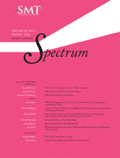
MUSIC THEORY SPECTRUM
Exploring the Depths of Music TheoryMUSIC THEORY SPECTRUM, published by Oxford University Press, serves as a premier journal in the field of music theory, recognized for its significant contributions and scholarship since its inception. With an ISSN of 0195-6167 and E-ISSN 1533-8339, this journal has established a distinguished position within the academic community, boasting an impressive Q1 status in the Music category for 2023 and ranking #17 out of 180 in Scopus for Arts and Humanities, Music, placing it within the 90th percentile. Despite its non-open access format, MUSIC THEORY SPECTRUM offers a wealth of research articles, reviews, and theoretical discussions aimed at both seasoned scholars and students alike. It spans from 1981 until present, fostering critical engagement and advancing understanding within the discipline. Researchers and music theorists will find this journal an invaluable resource for the latest insights and methodologies in music theory.
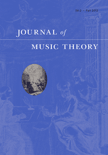
JOURNAL OF MUSIC THEORY
Bridging Theory and Practice in MusicJOURNAL OF MUSIC THEORY is a prestigious academic journal published by DUKE UNIVERSITY PRESS, dedicated to the rigorous exploration of music theory, analysis, and related fields. With an ISSN of 0022-2909 and an E-ISSN of 1941-7497, this journal has gained significant recognition for its scholarly contributions, evidenced by its ranking in the first quartile (Q1) in the field of Music as per the 2023 Category Quartiles. With an impressive position of #33 out of 180 in the Scopus Ranks for Arts and Humanities in Music and standing at the 81st percentile, it is an essential resource for both aspiring and established researchers, professionals, and students. Offering a platform for innovative research from 2002 to 2024, the journal aims to foster a deeper understanding of the complexities of music in contemporary discourse, making it an invaluable tool for anyone invested in the theoretical underpinnings of music.

OR SPECTRUM
Unveiling New Perspectives in Operations and Management ScienceOR SPECTRUM, published by SPRINGER, is a premier journal in the fields of Business, Management, and Operations Research, with a distinguished reputation established since its inception in 1979. As of 2023, it holds an impressive Q1 ranking in Business, Management and Accounting (miscellaneous) and a Q2 ranking in Management Science and Operations Research. The journal, which is indexed under ISSN 0171-6468 and E-ISSN 1436-6304, boasts a significant impact factor within its scope, making it a pivotal resource for cutting-edge research and theoretical developments. With access options that favor traditional subscriptions, OR SPECTRUM offers a robust platform for the dissemination of innovative ideas and methodologies, vital for academics, professionals, and students alike. The journal's commitment to excellence ensures its critical role in enhancing the understanding and application of operational research techniques around the globe.
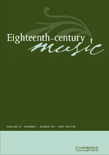
Eighteenth-Century Music
Advancing Scholarship in Eighteenth-Century SoundEighteenth-Century Music, published by Cambridge University Press, serves as a pivotal platform for scholarly discussion surrounding music from the eighteenth century, ranging from musicology to cultural studies. With an ISSN of 1478-5706 and an E-ISSN of 1478-5714, this journal offers a unique lens into the musical landscape of the era, dissecting its myriad influences and contexts. Although it currently holds a Q4 ranking in the field of Music as per the 2023 category quartiles, its contributions are invaluable for researchers, professionals, and students eager to delve into historical music research. Operating from the United Kingdom, with an address at Edinburgh Bldg, Shaftesbury Rd, Cambridge, England, this journal invites submissions that engage with the long-standing traditions and transformative contexts of the period. By fostering an academic dialogue among its readership, Eighteenth-Century Music aims to illuminate the complexities and innovations within the realm of eighteenth-century music studies.
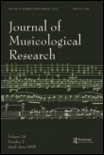
JOURNAL OF MUSICOLOGICAL RESEARCH
Decoding the Language of Music through ResearchJOURNAL OF MUSICOLOGICAL RESEARCH, published by Taylor & Francis Ltd, is an esteemed platform that delves into the field of musicology, contributing to the ongoing dialogue in music research and scholarship since its establishment in 1979. With an ISSN of 0141-1896 and an E-ISSN of 1547-7304, this journal serves as a vital resource for researchers, professionals, and students, offering insights into diverse musicological topics. Although currently categorized in Q4 in Music with Scopus rankings placing it at #110 out of 180 in the Arts and Humanities field, its commitment to excellence and broader discourses in music studies is evident. The journal does not have Open Access options, yet it provides accessible content through reputable academic channels, fostering scholarly exchanges within the community. It aims to publish high-quality research that advances understanding of musical practices and cultural implications, making it a critical resource for those passionate about music and its myriad influences.

Muzikoloski Zbornik
Celebrating Diverse Voices in MusicologyMuzikoloski Zbornik is a prominent open-access journal in the field of musicology, published by the esteemed University of Ljubljana Press since 1965. Hailing from Slovenia, this journal has been dedicated to advancing the study of musical heritage, theory, and practice, serving as a vital platform for researchers, professionals, and students alike. With a notable Q2 category ranking in the field of music and a Scopus ranking of 109 out of 180 in Arts and Humanities, Muzikoloski Zbornik showcases high-quality research, fostering discourse and collaboration among scholars globally. The journal embraces a diverse range of topics, from ethnomusicology to music education, ensuring its relevance in an ever-evolving academic landscape. By providing unrestricted access to its content, it champions the dissemination of knowledge and supports the growth of the musicology discipline.

Opus
Unveiling the Dimensions of Musical DiscourseOpus is an esteemed open-access journal published by the Associação Nacional de Pesquisa e Pós-Graduação em Música in Brazil, focusing on the field of music studies. With an ISSN of 1517-7017, Opus has been dedicated to fostering innovative research since its inception and has embraced the open-access model since 2009, ensuring that its findings are readily accessible to scholars and enthusiasts globally. The journal has achieved a commendable Q2 ranking in Music as of 2023, showcasing its impact and relevance within the arts and humanities. Although currently ranked #130 out of 180 in Scopus in the music category, Opus maintains a commitment to enhancing the scholarly discourse in musicology through empirical studies, theoretical analyses, and interdisciplinary approaches. The journal's convergence over the years, from 2017 to 2024, reflects its dedication to evolving educational and research methodologies in music. Situated in the vibrant academic landscape of Campinas, SP, Brazil, Opus invites researchers, professionals, and students to contribute to its mission of exploring the multifaceted dimensions of music.

MUSIK UND KIRCHE
Fostering Dialogue on Music's Role in Ecclesiastical LifeMUSIK UND KIRCHE is a distinguished journal published by BARENREITER-VERLAG that offers a scholarly platform for the exploration of the intersections between music and ecclesiastical contexts. With an ISSN of 0027-4771 and an E-ISSN of 2568-3128, this journal is particularly valuable for researchers, practitioners, and students engaged in musicology, religious studies, and cultural history. Although currently not open access, it provides a wealth of peer-reviewed articles that enhance understanding of music's role within church tradition and practice, thereby contributing significantly to the field. Despite fluctuating visibility in academic rankings—standing in Q4 of the 2023 category for Music, based on Scopus evaluations—its historical coverage from 2002 to 2012 and resumed publication since 2020 demonstrates its commitment to fostering rigorous academic discourse. The journal is based in Kassel, Germany, and serves as an essential resource for anyone interested in the dynamic relationship between music and spiritual life.
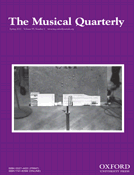
MUSICAL QUARTERLY
Advancing Musicology Through Critical DiscourseMUSICAL QUARTERLY, published by Oxford University Press Inc, is a distinguished journal in the field of music, with a publication history that stretches back to 1915. This esteemed journal, identifiable by its ISSN 0027-4631 and E-ISSN 1741-8399, provides a critical platform for scholarly discourse, analysis, and research in musicology and related disciplines, facilitating an understanding of both historical and contemporary musical practices. Although it operates without open access, it continues to attract a diverse readership of researchers, educators, and students alike, thanks to its well-curated articles and reviews that engage with music theory, history, and ethnomusicology. With a current Scopus rank of #119 out of 180 in the Arts and Humanities category and a 34th percentile ranking in Music, MUSICAL QUARTERLY plays a vital role in advancing knowledge and fostering collaboration within the music academic community. Its commitment to high-quality scholarship is reflected in its ongoing efforts to address the evolving landscape of music studies, making it an essential resource for anyone serious about exploring the rich tapestry of music scholarship.